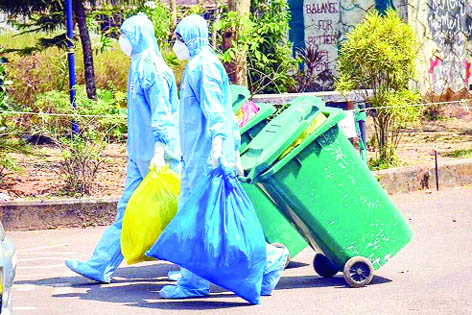Mahesh Chander Sudan
We, the people of India, have been defending ourselves against COVID-19 for quite some time. A deadly unknown virus challenged the existence of mankind across globe. It has infected more than eleven million people world wise with half a million fatalities. The virus still remains unchecked. A large number of scientists and medical professionals are working tirelessly to develop medicine/vaccine to combat the virus. In absence of any therapeutic treatment, Country wide lockdowns were declared to contain man to man transmission of the virus that resulted in shut down of all economic activities. It has helped government machinery to strengthen health care infrastructure and educate people to follow strict regimen of restrictions in their day to day life to avoid exposure to the virus. Disaster Management Authorities activated their plans to devise methods for handling specific contingencies and to arrest the spread of disease effectively. The present status of the COVID-19 across the globe indicates an alarming situation in the coming days. It is really a matter of concern for all of us that India today is third most COVID affected country in the world. Our team of doctors pan India is struggling to save affected patients through empirical method of treatment. It is felt that this pandemic requires multidimensional approach to contain its man to man transmission through strict regimen of social distancing and personal hygiene as per guidelines issued by state medical authorities to control all likely sources of infection including management of biomedical wastage.
Biomedical wastage or hospital wastage is any kind of waste containing infectious or potentially infectious material. It also includes waste associated with the generation of biomedical waste that may appear to be of medical or laboratory origin like packaging, unused bandages, infusion kits, biomolecules or organisms that are restricted from environmental release. Biomedical waste may be solid or liquid like discarded blood, sharps, unwanted microbiological cultures and stocks, identifiable body parts, other human or animal tissues etc. Biomedical waste is generated from biological and medical sources. Disposal of biomedical waste is a serious environmental concern as many medical wastes are infectious or biohazardous that could potentially lead to spread of infectious disease. Daily exposure to the waste leads to accumulation of harmful substances or microbes in the person’s body. Management of biomedical waste during ongoing COVID-19 becomes more critical. Biomedical waste must be properly managed and disposed of to protect the environment, general public and especially health care and sanitation workers who are at risk of exposure as an occupational hazard. Steps in the management of biomedical waste include generation, accumulation, handling, storage, treatment, transport and disposal.
We find that countries have drawn regulations for management of biomedical waste to ensure proper management and disposal of hospital waste. We too have the Biomedical waste (Management and handling) Rules 1998. On 28 Mar 2016 Biomedical Waste Management Rules (amended) were notified by Central Government. Implementation of new legislation has been entrusted to State Pollution control Boards or pollution control committees. However, the situation is desultory and harmful due to number of different disposal methods. To quote an example, proper method for disposing waste with body fluids needs to be incinerated or put to autoclave whereas most of medical facilities fail to follow the regulations. It is seen that biomedical waste finds its disposal either in water bodies or landfill sites along with household waste. Improper disposal of medical waste can lead to many diseases in animals as well as humans. Bio medical waste in the present COVID affected environment has increased in its shape and size and poses a big challenge for hospital administration to ensure proper scientific end disposal. However, to create competition to improve quality of disposal, accreditation from agencies like ISO, NABH, JCI have been instituted but the gap is still huge. We notice in our day to day life that hospital waste generated during ongoing pandemic is not being seriously dealt that leaves chance for its exposure to sanitary workers, rag pickers and other laborers.
The quantum of hospital waste in present context has increased manifold due to involved use of protection kits and other essential head gears. Media has brought few instances where these items have reached market through rag pickers for sale. Management of hospital waste till its final disposal should be dealt as per COVID protocol to minimize the likely source of infection to involved medical and sanitary staff. Required incinerators and autoclaves must be utilized for carrying out disposal of biomedical waste in the larger interest of the people. It is seen that home isolation and home quarantine is being allowed to COVID positive patients as a policy instrument to manage large number of patients and this needs special care as regards biomedical waste. A strict and close administrative control may bring desired results. Let us all be part of the team to fight COVID 19 by following required protocol, social distancing and helping administration in managing biomedical waste strictly in accordance with required scientific disposal to contain potential infection. Jai Hind, Jai Bharat.
The author is WgCdr (Retd)
feedbackexcelsior@gmail.com


